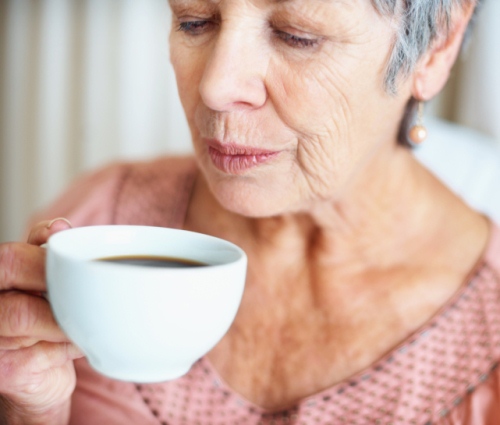11 Diseases Coffee Can Prevent
Frankly, we'll find any excuse we can to indulge in a cup of joe — or four. So when the Internet blows up with the latest medical study touting the newest health benefits of coffee, we're all ears.
The latest news? Coffee is now widely reported to reduce joint pain, especially in the wrists, hands, back, and neck. Study participants were tested doing the traditional office work after a cup of coffee (while the control had no coffee), and then self-reported a much lower intensity of pain if they had had a cup. (So if you're crouched over at a desk, like me right now, drink up.) Now, those daily Starbucks runs are justified!
But the truth is, coffee hasn't always been touted for its health benefits. The old wives' tale that it'll stunt your growth may have been debunked, but there are other drawbacks that make us question the java. Some negatives? Headaches, insomnia (a given for caffeine-aholics), heartburn, and palpitations, reports CNN. And we think it's safe to say that a milky, sugary, fatty iced coffee isn't going to do wonders for your health.
And of course, not every study can prove that coffee will really cure any disease on its own. As Dr. Alberto Ascherio, professor of epidemiology and nutrition at the Harvard School of Public Health said to CNN, it's more common for a study to find an association between coffee and health effects rather than prove how coffee can prevent diabetes, cancer, or depression.
Still, if coffee is a regular part of your morning (and afternoon, and night) routine, you can rest assured that you're doing your part for your body. If you're not a coffee drinker, start slowly, like you would with any new dietary habit. Everyone metabolizes coffee differently — it's why some people can crash after a cup and others stay up all night after a few sips — but it can still have positive health effects. Seeing as we have a large latte on our desk right now, we're happy with this news.
Skin Cancer
No, you shouldn't be chugging coffee instead of slapping on SPF, but this benefit is still worth noting. A recent study from Brigham and Women's Hospital in Boston found that those who drank coffee were less likely to develop basal cell carcinoma, the most common type of skin cancer. The researchers believe that the association may be due to caffeine; decaf coffee showed no decreased risk.
Breast Cancer
Of the newest breast cancer research, one study from Keio University in Tokyo found that coffee induces a breast-cancer-resistant protein in cancer cell lines. Women who may benefit the most from cancer prevention from coffee: post-menopausal women. Post-menopausal women who drank coffee had a lowered risk of non-hormone responsive breast cancer in one Swedish study. To get the most reduced risk, the researchers recommended a high intake of coffee, more than five cups per day. However, it's not all proven: another study from France found no real correlation between coffee, tea, and lower risk of breast cancer.
Diabetes
In the past, it was thought that coffee may prevent diabetes by improving the body's tolerance to insulin, or its tolerance to glucose. But one recent study from UCLA may have found how coffee can prevent diabetes: The protein, called sex hormone–binding globulin (SHBG), regulates the body's sex hormones, which are thought to play a role in type 2 diabetes. Higher levels of coffee consumption, the researchers found, increased levels of SHBG in the blood — which showed an inverse association between coffee consumption and diabetes. Those who drank about four cups of coffee per day had much higher levels of SHBG than non-drinkers.
Alzheimer's
When participants between the ages of 65 and 88 were tested in a recent study, those who drank more coffee showed fewer signs of dementia, and avoided early onset Alzheimer's. Again, the secret may be in the caffeine; the "magic number" of cups is about three cups, or 1,200 nanograms per milliliters of caffeine. Said researcher Gary Arendash to PsychCentral, "Moderate daily consumption of caffeinated coffee appears to be the best dietary option for long-term protection against Alzheimer's memory loss... Coffee is inexpensive, readily available, easily gets into the brain, and has few side-effects for most of us." (photo Thinkstock/ Hemera)
Colon Cancer
A team of researchers at the National Cancer Institute, who studied a group of Americans for 15 years, found that those who drank four or more cups of coffee (both regular and decaf) per day had a 15 percent lower risk of developing colon cancer. No one's quite sure why, but it might be those compounds in coffee at work again. An older study found an antioxidant compound, methylpyridinium, that's proven to be extremely effective in fighting colon cancer. The compound is found almost exclusively in coffee and coffee products. Researchers from the University of Minnesota also note that coffee contains a higher amount of polyphenols than tea or red wine. They found that the caffeic acid in coffee suppressed colon cancer cell from spreading.
Prostate Cancer
Add another type of cancer to the list: Studies from Harvard Public School of Health show that men who drank more than six cups of coffee per day (talk about a caffeine jolt) had a lower risk of lethal prostate cancer. It's believed that it's not the caffeine in coffee that does the trick here, but the phenolic acids and antioxidant activity that cuts cancer risk; patients who drank decaf coffee still had a decreased risk of lethal prostate cancer. However, coffee doesn't lower the risk of all prostate cancer, studies note, just the "high grade" strains. And researchers from Australia believe that green tea may pack a stronger punch against prostate cancer than coffee.
Endometrial cancer
Endometrial cancer is the most common type of uterine cancer, affecting women usually between the ages of 60 and 70. When obese, post-menopausal women were studied for their coffee habits, those who drank two or more cups of coffee per day had a lower risk of endometrial cancer. Another study from the Harvard Public School of Health found that even one cup of coffee per day significantly reduced risk. It could be because coffee lowers levels of insulin and estrogen. No word yet on if decaf coffee also lowers endometrial cancer risk. Be forewarned, though: black coffee will have a bigger impact in cutting risk. As another study from Harvard concluded, the "addition of substantial sugar and cream to coffee could offset any potential benefits."
Liver Cancer
One University of Minnesota study found that high coffee intake — more than three cups per day — significantly decreased risk of hepatocellular carcinoma, the most common type of liver cancer. And it's been found in several studies that a higher consumption of coffee is usually associated with a lower risk of liver cancer.
Oral Cancer
Oral cancer, or cancer of the mouth, can affect the gums, lining of the cheeks, and the floor and roof of the mouth. Caffeinated coffee showed a reduction of risk of cancer in the oral cavity and pharynx in one U.K. study. But, the risk was only lowered with about four cups of coffee per day.
Depression
The more you drink coffee, the less depressed you'll be? That's what one study found, which followed 50,000 women between the ages of 35 and 50. Those who drank two to three cups per day were 15 percent less likely to develop symptoms of depression; however, the reason is unclear. The researchers said it might even be because of lifestyle; those who drink coffee tend to be more "behaviorally activated" than their non-drinking peers, which could mean they were already less prone to depression. (photo Thinkstock/ iStockphoto)
Death
We're not sure if you can count death as a disease, but coffee just might be the trick to living longer. A study of 400,000 Americans between the ages of 50 and 71 found that those who drank two to three cups per day were 10 to 15 percent less likely to die in the next 13 years. Some attribute its powers to antioxidants, which protect the body from free radicals.
This post was originally published on September 27, 2012.


